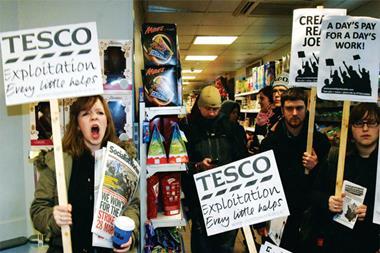Hmm. I couldn’t help feel a tad ambivalent when I discovered that it’s not just bankers who’ve seen their pay packages squeezed of late.
On the face of it, a 20.7% cut of the sort Justin King experienced last year seems eyewateringly harsh, but that’s only because I’m thinking of the Greek level of hardship it would inflict on the mere mortals among us. Your heart stops bleeding pretty quickly when you find out that he still took home a cool £2.66m!
On the other hand, Sainsbury’s profits rose 9% between 2010 and 2011. It was just that King failed to hit his targets. So did he deserve to have his bonus slashed in half? Equally, should Britvic CEO Paul Moody have been punished for flat sales of still drinks and a poor performance in Ireland with a 53% pay cut to a derisory (by senior food and drink exec standards) £517,000? And did Diageo’s Paul Walsh merit a whopping 59% hike in his pay package for helping boost the company’s share price 39%?
It’s a tough one. And I don’t think it helps that as in so many other industries - most notably banking - the link between performance and pay in the higher echelons of the grocery industry is inconsistent at best and tenuous at worst.
Then again, grocery chiefs are apparently among those who offer the best value for money. Some might question whether building exposure to emerging markets in Asia and South America was enough to justify an 8.2% pay hike for SAB Miller CEO Graham Mackay to £3.44m, but Mackay tops the list in terms of shareholder returns per £1 he’s paid, according to research by remuneration consultants Patterson Associates. Shareholders received a tidy £21,950 per £1 he earned between 2006 and 2010. And he wasn’t the only one who put a smile on shareholder faces. Under Walsh, Diageo shareholders received £9,179 and under Sir Terry Leahy, Tesco shareholders got £1,028.
There are a few exceptions, however. Under Sir Stuart Rose, M&S shareholders actually lost £4,979 per £1 he was paid - which kind of makes you wonder how Marc Bolland’s generous £4.4m package (pocketed despite missed targets) stacks up in terms of shareholder returns. Doesn’t it?



















No comments yet